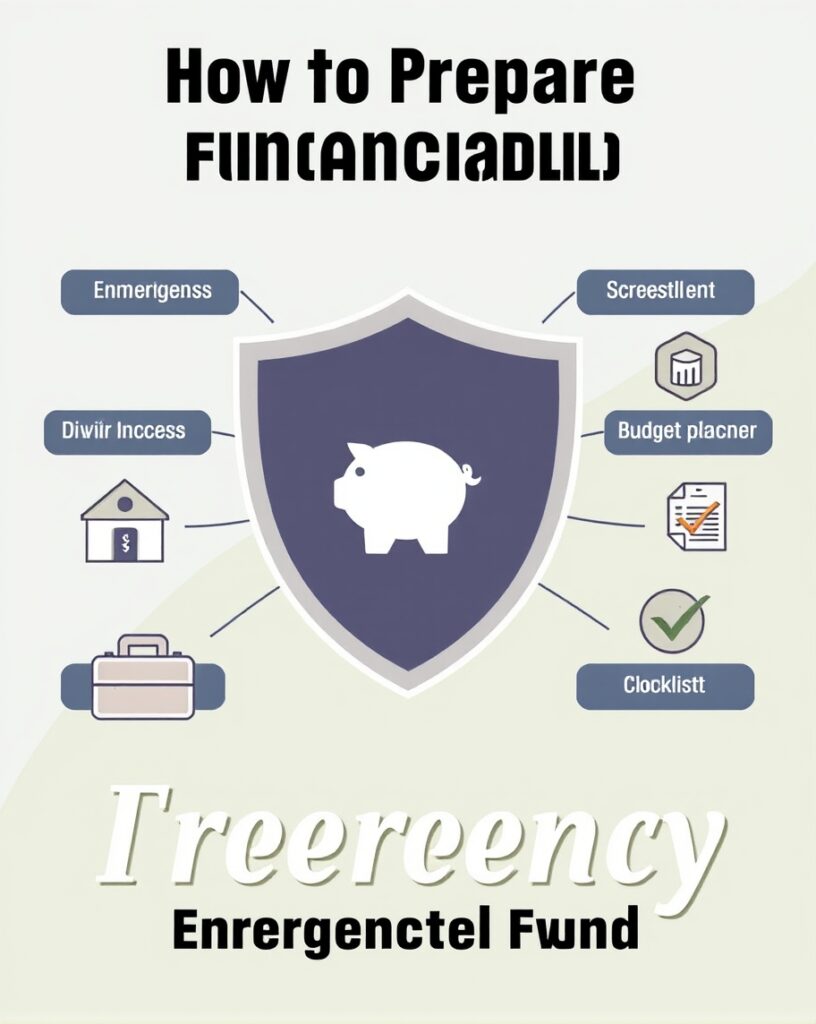Life is unpredictable. From medical emergencies and job loss to natural disasters and unexpected home repairs, unforeseen events can strain your finances and create significant stress. However, with proper preparation, you can build a financial safety net that helps you navigate these challenges with confidence. This guide will outline practical steps to help you prepare financially for unexpected events, ensuring you and your loved ones are secure during tough times.
1. Build an Emergency Fund
An emergency fund is your first line of defense against unexpected financial setbacks. It provides a safety net that allows you to cover essential expenses without resorting to credit cards or loans.
How to Build an Emergency Fund:
- Set a Goal: Aim to save three to six months’ worth of living expenses. This amount will vary based on your personal circumstances, such as job stability and family size.
- Open a Separate Savings Account: Keep your emergency fund in a separate, easily accessible account to avoid the temptation of spending it on non-emergencies.
- Automate Savings: Set up automatic transfers from your checking account to your emergency fund to ensure consistent contributions.
2. Get Adequate Insurance Coverage
Insurance is essential for protecting yourself and your assets against unexpected events. Evaluate your current policies and consider additional coverage to fill any gaps.
Key Types of Insurance:
- Health Insurance: Ensure you have comprehensive health coverage to minimize out-of-pocket expenses during medical emergencies.
- Homeowners or Renters Insurance: Protect your property and belongings from theft, damage, or disasters. Consider adding flood or earthquake insurance if you live in an at-risk area.
- Auto Insurance: Ensure your auto insurance covers both liability and collision to protect against accidents.
- Disability Insurance: This policy replaces a portion of your income if you become unable to work due to illness or injury.
Tip: Review your insurance policies annually to ensure adequate coverage and explore options for bundling policies to save on premiums.
3. Diversify Your Income Streams
Relying on a single source of income can be risky, especially if unexpected events lead to job loss or reduced hours. Diversifying your income streams can provide financial stability and security.
Ways to Diversify Income:
- Side Hustles: Consider freelance work, consulting, or starting a small business based on your skills and interests.
- Investments: Invest in dividend-paying stocks, real estate, or mutual funds that generate passive income.
- Skills Development: Invest in education or training that enhances your skills and makes you more marketable, increasing job security and potential earnings.
4. Create a Budget and Monitor Your Spending
Having a clear budget helps you understand your financial situation and prepares you for unexpected expenses. Regularly monitoring your spending can also reveal areas where you can save.
Steps to Create an Effective Budget:
- Track Your Income and Expenses: Use budgeting apps or spreadsheets to categorize and track your income and expenses. This will help you identify spending patterns and areas for improvement.
- Prioritize Savings: Treat savings as a non-negotiable expense. Allocate a percentage of your income to savings each month.
- Adjust as Needed: Revisit your budget regularly and adjust it based on changes in income, expenses, or unexpected events.
5. Prepare for Potential Job Loss
Job loss can be one of the most significant unexpected financial challenges. Preparing for this possibility can help you manage the transition more smoothly.
How to Prepare for Job Loss:
- Build a Robust Resume: Keep your resume updated and tailor it to highlight your skills and achievements. This will make you ready to apply for new opportunities if needed.
- Network: Build and maintain a professional network. Connections can help you find job opportunities and gain referrals.
- Research Unemployment Benefits: Familiarize yourself with your country’s unemployment benefits and how to apply for them if needed. This can provide crucial support during your job search.
6. Stay Informed About Your Financial Health
Regularly reviewing your financial health helps you stay aware of your progress toward your goals and makes it easier to identify areas for improvement.
Key Financial Health Indicators:
- Net Worth: Calculate your net worth by subtracting your liabilities from your assets. Track this figure over time to see your financial progress.
- Debt-to-Income Ratio: Calculate your debt-to-income ratio to understand how much of your income goes toward paying off debt. A lower ratio is generally better for your financial health.
- Credit Score: Regularly check your credit score and report to identify any discrepancies or areas for improvement. A good credit score can help you secure better loan terms if needed.
7. Educate Yourself on Financial Planning
Knowledge is power when it comes to financial preparedness. Educating yourself about financial planning can help you make informed decisions and prepare for unexpected events.
Resources for Financial Education:
- Books and Online Courses: Invest time in reading books on personal finance and taking online courses to improve your understanding of budgeting, investing, and saving.
- Financial Advisors: Consider consulting a certified financial planner for personalized advice and strategies tailored to your situation.
- Podcasts and Blogs: Follow financial podcasts and blogs that offer insights on various financial topics, from saving strategies to investment tips.
8. Practice Flexibility and Adaptability
Being adaptable in the face of unexpected events is crucial for maintaining financial stability. Develop a mindset that embraces change and prepares you for whatever life may throw your way.
Ways to Cultivate Flexibility:
- Stay Calm Under Pressure: Develop coping mechanisms to manage stress during uncertain times. Mindfulness practices, such as meditation or yoga, can help maintain your mental well-being.
- Reassess Your Financial Goals: Regularly review your financial goals and adjust them based on changing circumstances. This will help you stay focused and motivated, even during challenging times.
- Embrace a Long-Term Perspective: Understand that unexpected events are a part of life. Keep a long-term perspective on your finances, recognizing that temporary setbacks can often be overcome with time and effort.

